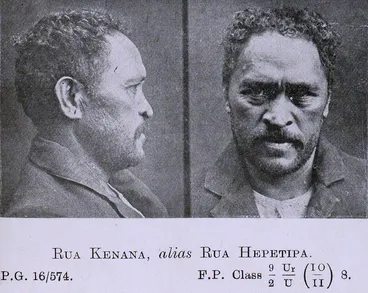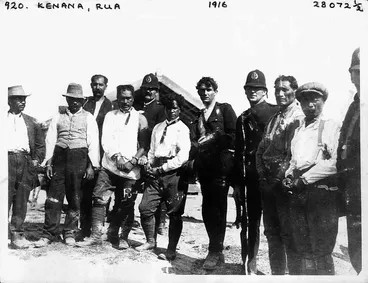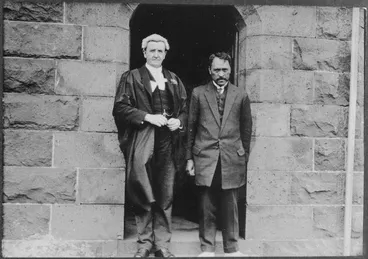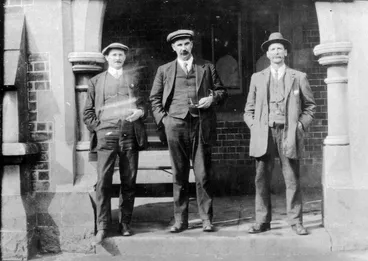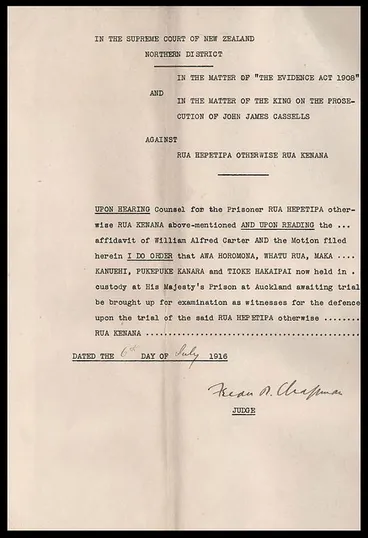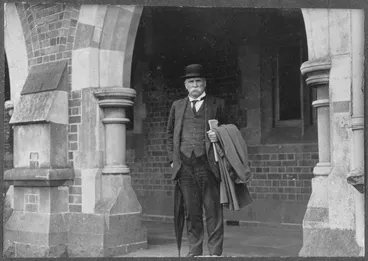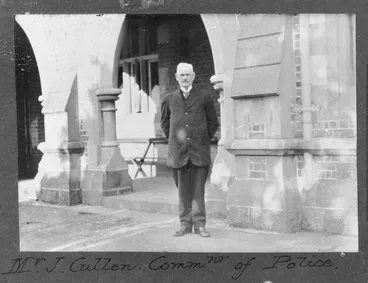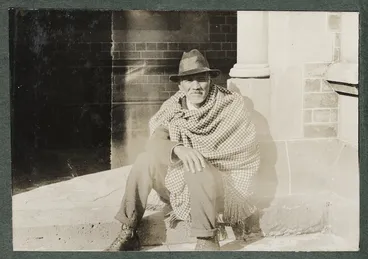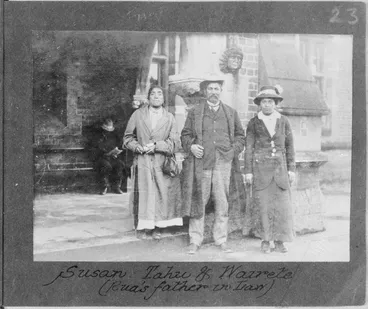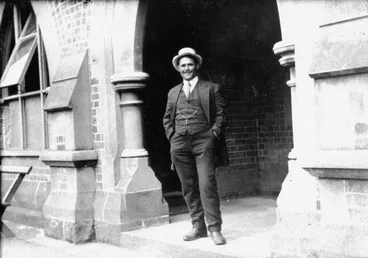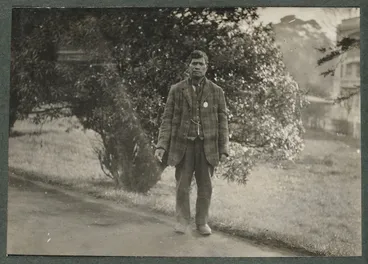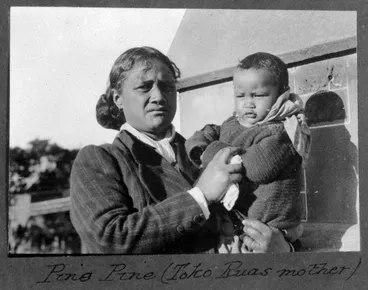Trial of Rua Kēnana
A DigitalNZ Story by Janice
A set of images and articles on the trial of Tūhoe prophet Rua Kēnana in 1916.
Rua Kēnana, alias Rua Hepetipa : 1916 Police Gazette
Archives New Zealand Te Rua Mahara o te Kāwanatanga
Why was Rua Kēnana arrested?
The government was suspicious of Rua, and the Tohunga Suppression Act 1907 was aimed mainly at him. When the First World War broke out, he was accused of sedition because he had pacifist beliefs and opposed conscription of Māori into the armed forces. The government harassed Rua, using liquor laws to arrest him for selling illicit alcohol at Maungapōhatu. He refused to attend court, claiming he was busy with a harvest. Later he declined to accompany policemen who came to arrest him.
Source: 'Rua Kēnana', URL: https://nzhistory.govt.nz/people/rua-kenana, (Ministry for Culture and Heritage), updated 8-Nov-2017
Arrest of Rua Kēnana, 2 April 1916
Archives New Zealand Te Rua Mahara o te Kāwanatanga
The day of the arrest — 2 April 1916
Rua was arrested at Maungapohatu by an armed force of 57 constables sent secretly from Auckland and two smaller contingents from Gisborne and Whakatane. He was seized on the marae, where he was standing unarmed, accompanied by Whatu and Toko, waiting to greet the police. At the same moment, a shot was fired. In the ensuing mêlée two Maori were killed, one of whom was Toko.
Source: Judith Binney. 'Rua Kenana Hepetipa', Dictionary of New Zealand Biography, first published in 1996. Te Ara - the Encyclopedia of New Zealand, https://teara.govt.nz/en/biographies/3r32/rua-kenana-hepetipa (accessed 7 February 2020)
Defence counsel John Lundon and Rua Kenana standing outside the Supreme Court, Auckland
Alexander Turnbull Library
Trial and sentencing of Rua Kēnana
Rua’s trial in the Supreme Court was one of the longest in New Zealand history.
Source: 'Rua Kēnana', URL: https://nzhistory.govt.nz/people/rua-kenana, (Ministry for Culture and Heritage), updated 8-Nov-2017
Tried: 17 October 1916, Auckland Supreme Court
Charges: Sedition, resisting police, counselling persons to murder, counselling persons to discharge arms with intent to resist lawful apprehension, counselling persons to wound, counselling persons to assault police, counselling persons to do bodily harm
Sentences: Acquitted of sedition, one year’s imprisonment and 18 months’ reformative detention for resisting police; the jury disagreed on the other charges and they were dismissed by the court
Source: Rua Kēnana, resisting police', URL: https://nzhistory.govt.nz/media/photo/rua-kenana-resisting-police, (Ministry for Culture and Heritage), updated 10-Jul-2018
Court order
Witnesses ordered to appear at the trial of Rua Kēnana.
Archives New Zealand Te Rua Mahara o te Kāwanatanga
The short story
Arrest, trial and imprisonment of Rua Kēnana
Manatū Taonga, the Ministry for Culture and Heritage
Judge Fredrick Chapman
His sentencing of the Maori leader Rua Kēnana was criticised as being unnecessarily punitive; eight of the jurors protested in a petition to Parliament.
Source: Peter Spiller. 'Chapman, Frederick Revans', Dictionary of New Zealand Biography, first published in 1996. Te Ara - the Encyclopedia of New Zealand, https://teara.govt.nz/en/biographies/3c10/chapman-frederick-revans (accessed 2 February 2020)
Judge Frederick Chapman outside the Supreme Court, Auckland
Alexander Turnbull Library
John Cullen
Who led the invasion of Maungapōhatu and the arrest of Rua Kēnana.
John Cullen
Alexander Turnbull Library
In support of Rua Kēnana
Huhana Tutakangahau( Rua's follower) Tahu Hirawana (Rua's father-in-law), and Waereti Irohia (Rua's wife).
Huhana Tutakangahau, Tahu Hirawana, and Waereti Irohia, outside the Supreme Court, Auckland
Alexander Turnbull Library
Tore Biddell
Son-in-law of Rua Kēnana
Alexander Turnbull Library
Pinepine Te Rika- first wife of Rua Kēnana Hepetipa
Pinepine with grandson Hami Biddle at Rua's trial.
Alexander Turnbull Library
Rua on trial
A reporter's impressions of Rua, and his trial in 1916.
National Library of New Zealand
Interesting evidence
Evidence from Inspector Sheehan and testimoney from Heyler Widdowburn Bishop.
National Library of New Zealand
A pardon long overdue
More than 100 years later the Crown acknowledged its wrongs and pardons Tūhoe pacifist Rua Kēnana.
Plans under way to pardon Rua Kēnana
Radio New Zealand
Kaumātua 'elated' at Rua Kēnana pardon passing first hurdle
Radio New Zealand
Rua Kenana officially pardoned by Crown
Radio New Zealand
